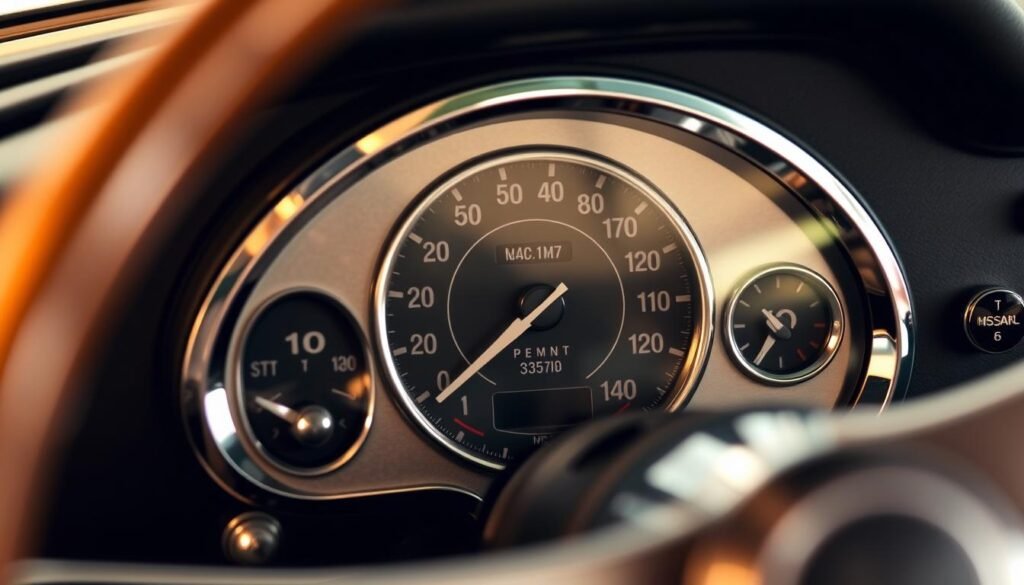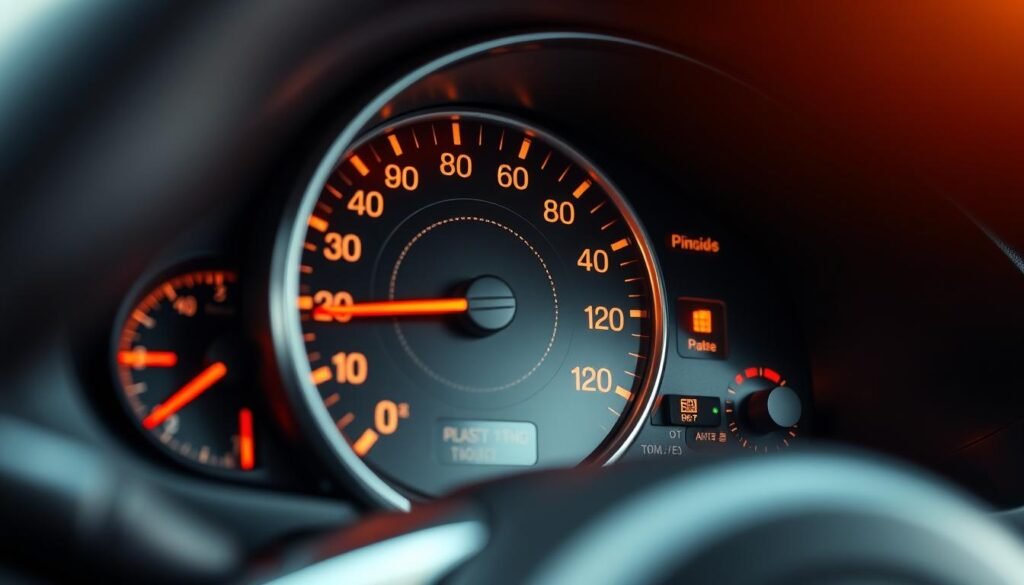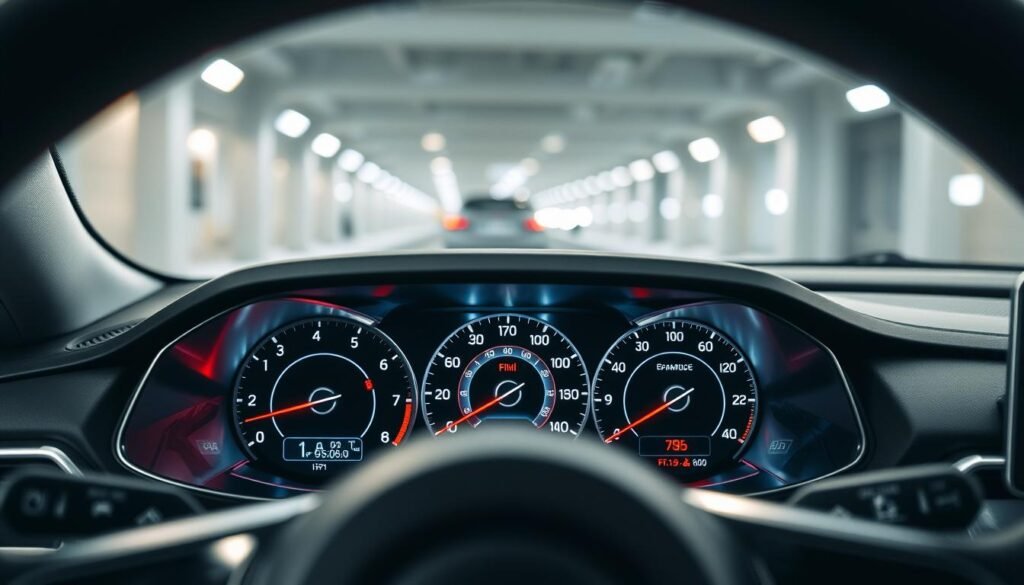Have you ever found yourself driving with a faulty speedometer, unsure of your actual speed?
This is more common than you think, and it can lead to safety issues and potential traffic violations. Your vehicle‘s speedometer is crucial for maintaining legal driving practices and ensuring you’re aware of your speed.
A malfunctioning speedometer can be a significant problem, but understanding the causes and repair options can help you make informed decisions. This guide will walk you through common issues, diagnosis, and repair costs, including DIY solutions and professional repair options.
Key Takeaways
- Understanding the importance of a functioning speedometer for safe driving.
- Common causes of speedometer malfunction and their impact.
- Options for diagnosing speedometer issues.
- DIY and professional repair options for fixing a speedometer.
- Factors influencing the cost of speedometer repair.
Understanding Speedometer Problems
Your vehicle’s speedometer plays a vital role in ensuring you’re driving safely and within legal speed limits. It provides you with crucial information about your vehicle’s speed, helping you avoid potential hazards and legal issues related to speeding.
Why Your Speedometer Matters
A functioning speedometer is essential for safe driving. Without it, you might not be aware of your actual speed, potentially leading to dangerous situations on the road. Moreover, driving with a malfunctioning speedometer can result in legal consequences, such as speeding tickets, even if you’re unknowingly driving within the limit.
Signs of a Malfunctioning Speedometer
Identifying a speedometer problem early can prevent further complications. Common signs include erratic needle movement, inconsistent or inaccurate speed readings, and complete failure of the speedometer. For digital speedometers, error codes or a blank screen can indicate issues. Sometimes, the problem may be accompanied by other dashboard gauge malfunctions or unusual noises from the dashboard area, signaling a deeper problem with your vehicle’s speedometer mechanism.
Addressing these issues promptly is crucial to avoid safety risks and potential legal complications. If you notice your speedometer may be malfunctioning, it’s advisable to investigate further to determine the cause and appropriate repair.
Common Causes of Speedometer Failure
Understanding the common causes of speedometer failure is crucial for effective troubleshooting and repair. Your vehicle’s speedometer is an essential component that provides critical information about your speed on the road.
Speed Sensor Issues
One of the primary causes of speedometer failure is issues with the speed sensor. The speed sensor is responsible for measuring the vehicle’s speed and transmitting this information to the speedometer. Faulty or damaged speed sensors can lead to inaccurate or completely failed speedometer readings. Common problems include worn-out or corroded connectors, damaged wiring, or a malfunctioning sensor itself.
Electrical Problems and Wiring Damage
Electrical issues and wiring damage are another common cause of speedometer failure. Corrosion, cuts, or wear on the wiring can disrupt the signal between the speed sensor and the speedometer, leading to erratic or non-functional speedometer behavior. Regular inspection of the wiring and connectors can help identify potential issues before they cause significant problems.
Instrument Cluster Failures
The instrument cluster houses the speedometer along with other vital gauges and indicators. Internal mechanical failures within the cluster, circuit board issues in digital instrument clusters, or failures of stepper motors controlling analog gauge needles can all affect speedometer operation. Extreme temperature fluctuations can also damage sensitive electronic components in the cluster.
| Cause | Description | Potential Repair Cost |
|---|---|---|
| Speed Sensor Issues | Faulty or damaged speed sensors | $50-$200 |
| Electrical Problems and Wiring Damage | Corrosion, cuts, or wear on wiring | $50-$150 |
| Instrument Cluster Failures | Internal mechanical failures or circuit board issues | $189-$400 |

Can You Drive With a Broken Speedometer?
Operating a vehicle with a broken speedometer poses several risks. Your ability to gauge your speed accurately is crucial for safe driving. Without a functioning speedometer, you may unknowingly exceed safe speed limits or drive too slowly, potentially endangering yourself and others on the road.
Legal Implications
Driving with a broken speedometer can lead to legal issues. You may receive a speeding ticket if you’re unable to monitor your speed. Law enforcement expects drivers to be aware of their vehicle‘s speed, and a malfunctioning speedometer is not a valid excuse for speeding.
Safety Concerns
A faulty speedometer compromises your safety and the safety of others. You’re at risk of driving too fast for road conditions or too slow for highways, creating hazards. Maintaining a consistent speed is vital for car performance and fuel efficiency. Your ability to adjust to different driving conditions is impaired without a working speedometer.
| Risks | Consequences |
|---|---|
| Exceeding safe speeds | Accidents, speeding tickets |
| Driving too slowly | Traffic hazards, potential rear-end collisions |
| Lack of speed awareness | Increased risk in school zones, construction areas |
How to Diagnose Speedometer Problems
Diagnosing a faulty speedometer involves a series of checks that can help you pinpoint the issue. To start, you need to understand the basic components involved in your vehicle’s speedometer system, including the speed sensor, wiring, and instrument cluster.
Basic Troubleshooting Steps
Begin by checking the basics. Ensure that your vehicle’s speed sensor is clean and functioning correctly. A faulty speed sensor can cause incorrect speed readings. You should also inspect the wiring connected to the speed sensor and the instrument cluster for any signs of damage or wear.
- Check the speed sensor for cleanliness and proper function.
- Inspect wiring for damage or wear.
- Verify that the instrument cluster is working correctly.
When to Seek Professional Diagnosis
While basic troubleshooting can help identify some issues, more complex problems may require professional diagnosis. If you’re experiencing intermittent issues or multiple system failures, it’s time to consult a technician. They have access to specialized diagnostic equipment that can pinpoint electrical problems more accurately than DIY methods.

- Identify situations where professional diagnosis is necessary.
- Understand that complex instrument cluster issues often require dealer-level diagnostic tools.
- Recognize that attempting DIY repairs on modern vehicle electronics can sometimes cause additional problems.
By knowing when to seek professional help, you can save time and money by avoiding unnecessary parts replacement. Finding a reputable shop that specializes in automotive electrical and instrument cluster repairs is crucial for a proper diagnosis and repair.
How Much Does It Cost to Fix a Speedometer?

The expense of repairing a speedometer depends on several key factors, including the type of vehicle you own, the nature of the problem, and the labor rates in your area.
Speed Sensor Replacement Costs ($50-$200)
Replacing a faulty speed sensor is a common fix for speedometer issues. The cost for this repair can range from $50 to $200, depending on the sensor’s quality and your vehicle’s make and model.
Luxury and European vehicles often have more expensive speed sensors due to their complex design and the higher cost of parts.
Instrument Cluster Repair Costs ($189-$400)
The instrument cluster is another critical component that, when faulty, can cause speedometer problems. Repairing or replacing it can cost between $189 and $400. The wide range in cost is due to the variability in labor rates and the complexity of the repair.
It’s essential to get a detailed quote from a mechanic to understand what you’re paying for.
Wiring Repair Costs ($50-$150)
Wiring issues can also affect your speedometer’s accuracy. Fixing wiring problems typically costs between $50 and $150, depending on the extent of the damage and the labor involved.
Factors That Affect Repair Costs
Several factors can influence the cost of speedometer repairs, including your vehicle’s age, make, and model. Luxury vehicles and those with complex electrical systems tend to have higher repair costs. Additionally, labor rates vary by location, and dealerships often charge more than independent repair shops.
To ensure fair pricing, it’s advisable to get multiple repair quotes. Moreover, if your vehicle is still under warranty, certain repairs might be covered.
DIY Speedometer Repair Guide
A malfunctioning speedometer can be frustrating, but with this guide, you can diagnose and repair it yourself. Before starting, ensure you have a basic understanding of your vehicle’s speedometer system.
Tools You’ll Need
To begin the repair, you’ll need a few essential tools. These include a multimeter for checking electrical circuits, a wiring diagram specific to your vehicle, and a replacement speed sensor if necessary. Having the right tools will make the process smoother and more efficient.
Replacing a Speed Sensor
If your speedometer issue is due to a faulty speed sensor, replacing it is relatively straightforward. First, locate the speed sensor, usually found on the transmission or gearbox. Disconnect the electrical connector, remove the sensor, and install a new one. Ensure it’s properly secured and reconnect the wiring.
Checking and Repairing Wiring
Damaged or corroded wiring can cause speedometer malfunctions. Inspect the wiring harness for any signs of damage. Use a multimeter to check for continuity and voltage. If you find any issues, repair or replace the wiring as needed to ensure your speedometer receives the correct signals.
Calibrating Your Speedometer
After repairs, calibrating your speedometer is crucial for accurate readings. You can use a handheld GPS device, a phone app, or a stopwatch to calibrate it. Find a straight, traffic-free road and follow the manufacturer’s calibration procedure. Proper calibration ensures accurate speed readings and odometer tracking, affecting other systems like cruise control.
| Calibration Method | Description | Tools Needed |
|---|---|---|
| GPS Device | Compare GPS speed with speedometer reading | Handheld GPS device |
| Phone App | Use a speedometer app to verify speed | Smartphone with GPS app |
| Stopwatch | Measure time over a known distance | Stopwatch, measured distance |
By following these steps and using the right tools, you can successfully repair and calibrate your vehicle’s speedometer, ensuring it works properly and provides accurate speed readings.
Keeping Your Vehicle Safe and Legal
Maintaining a properly working speedometer is not just about avoiding tickets; it’s also about ensuring your safety and the safety of others on the road. A malfunctioning speedometer can lead to reckless driving and potentially cause accidents. Regular vehicle maintenance is key to preventing speedometer issues before they arise.
By addressing broken speedometer problems promptly, you can avoid more costly repairs down the line. Moreover, accurate speed monitoring contributes to overall road safety and can even improve fuel efficiency. It’s also important to document any repairs for insurance purposes and to maintain your car‘s resale value.
As a responsible driver, it’s your duty to ensure all safety-related components, including the speedometer, are in good working condition. Regular inspections can help identify potential issues before they become major problems, keeping you safe while driving.
FAQ
What are the common causes of a malfunctioning speedometer?
Common causes include speed sensor issues, electrical problems, wiring damage, and instrument cluster failures. These problems can be due to wear and tear, corrosion, or damage from road debris.
Can I drive my car with a broken speedometer?
While you can still drive your car, a broken speedometer can lead to safety concerns and legal implications. You may unintentionally exceed speed limits or fail to adjust your speed according to road conditions.
What are the signs of a faulty speed sensor?
Signs include erratic or inaccurate speed readings, an inoperative speedometer, or the illumination of the check engine light on your dashboard. If you notice any of these symptoms, it’s best to have your vehicle inspected by a mechanic.
How do I diagnose speedometer problems?
Start with basic troubleshooting steps such as checking the speed sensor, wiring, and instrument cluster for any signs of damage or wear. If you’re unsure, consult a professional mechanic for a thorough diagnosis.
What factors affect the cost of repairing a speedometer?
The cost is influenced by the make and model of your vehicle, the type of repair needed (e.g., speed sensor replacement, instrument cluster repair, or wiring repair), and labor costs charged by the repair shop.
Can I repair my speedometer myself?
Yes, if you have the right tools and technical knowledge. You can replace a speed sensor, check and repair wiring, or calibrate your speedometer. However, for complex issues or if you’re unsure, it’s recommended to seek the help of a professional mechanic.
What is the average cost to repair a speedometer?
The average cost varies depending on the repair needed. Speed sensor replacement can cost between -0, instrument cluster repair can range from 9-0, and wiring repair can cost between -0.